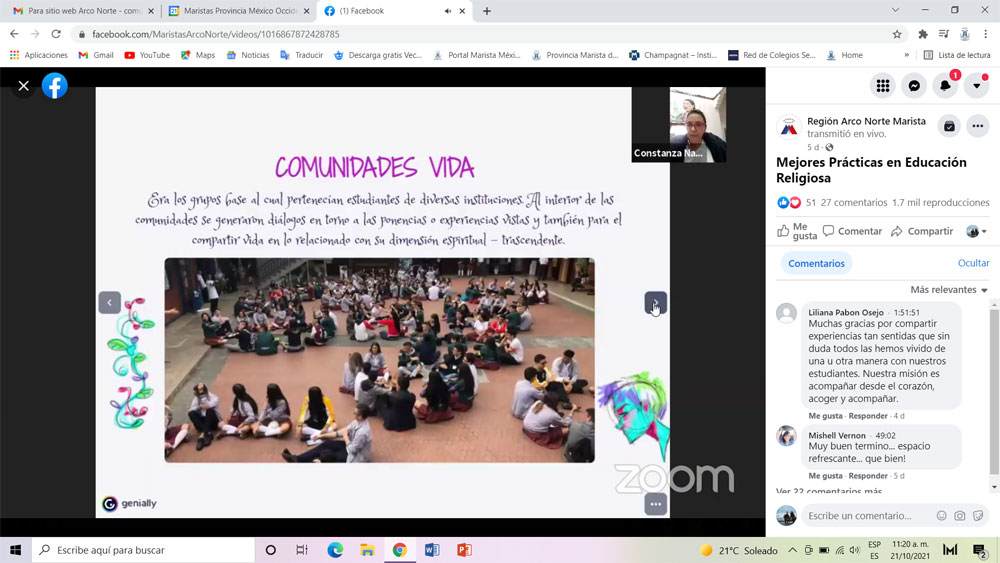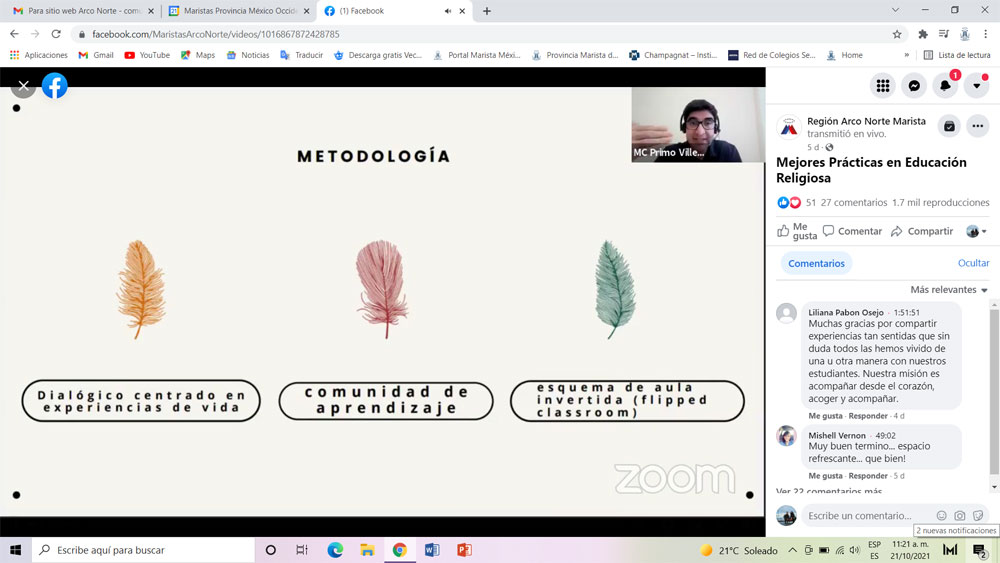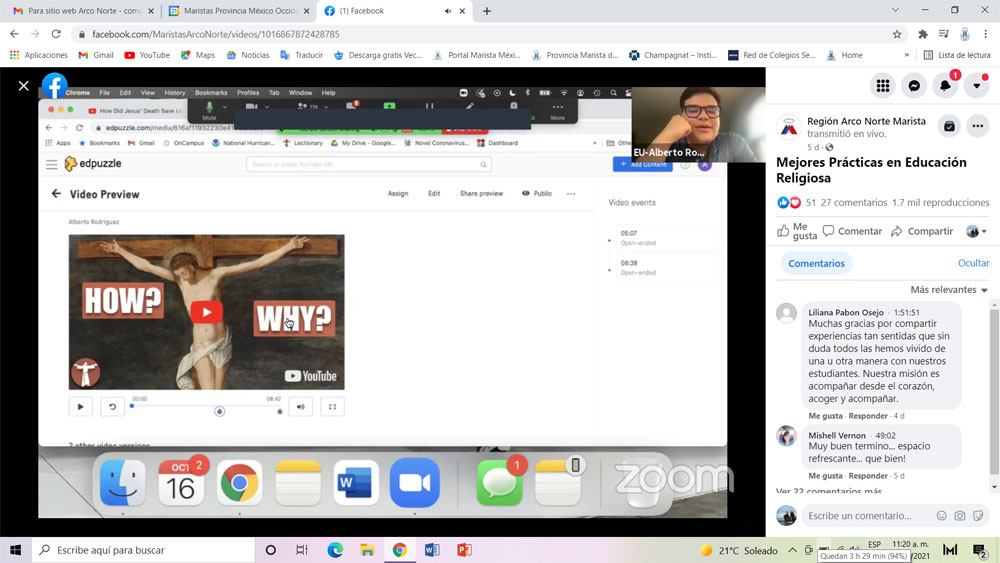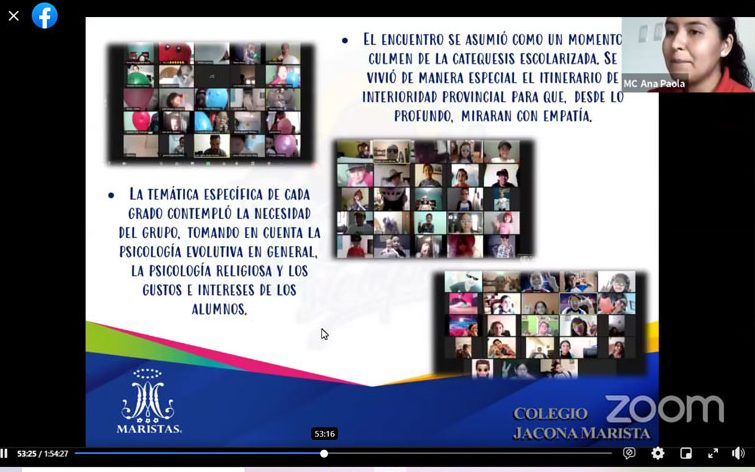Last Saturday, October 16, the Best Practices in Religious
Education Regional Meeting was held, organized by the Evangelization
team of Arco Norte, where teachers of different areas like faith education,
religion and catechesis connected from the provinces of the United States,
Central Mexico, Occidental Mexico, Central America, Norandina and Canada.
The objective of this meeting was to create ties between all the Marists of
Arco Norte on the subject of catechesis and religious education in schools,
as well as to help teachers improve and animate, in community, the
experience and mission of accompanying the faith of children and young
people.
During the meeting, there were different presentations of best practices
that, throughout the region, teachers have brought to their classrooms:
Alberto Rodríguez, from the USA, spoke about the online tool
called Edpuzzle that allows you to edit videos for a more dynamic and
interactive class, through questions, creation of quizzes or voice notes,
where teachers and students actively participate in the day's
lesson. Undoubtedly, there are countless digital tools that allow this type of
different and dynamic activities during virtual classes.
Primitivo Villegas, from Occidental Mexico, presented the "Teacher training
program in the Human-Christian area" which aims to manage active
participation, multidisciplinary and systemic knowledge to train teachers
with an ethical project that assumes life in a contextualized, reflective and
critical way, but also in a compassionate and committed one to better
educate their students. This program has as methodologies the dialogue
focused on life experiences, a learning community and a flipped classroom
scheme.
Jonhy Castillo and Ana Paola Frayle, from Central Mexico, spoke about the
"Virtual Meeting Space" which aims to take a break from the day to day life
to have a moment of interiority about what we are living in these times of
confinement, as well as experiencing an encounter with God through
sharing experiences with their group and finding a meaning of what they’re
going through, making them feel in company, letting all the senses flow to
be able to focus on what God and our heart tells us.
Constanza Naranjo, from Norandina, presented “National and Zonal Marist
Encounters of Schools of Religious Education”, where meeting spaces are
fostered between students from Marist institutions in Colombia, in order to
share knowledge and experiences that allow a bigger vision of the world,
thus how to educate them for the exercise of religious freedom and qualify
them in their spiritual competence. The methodology used was based on
speakers, forums, reports, life communities and guided visits.
Nohemy Cuéllar, from Central America, spoke about the Genially platforms,
a software that allows interactive content through the creation of images,
infographics, presentations, microsites, catalogs, maps, among others, which
can be equipped with interactive effects and animations to use in classes
and have more interaction with students. She also presented Nearpod, a
tool that allows the creation of a guided presentation that incorporates a
multimodal content, and interacts with the audience/students through
activities that allow synchronous or asynchronous work. Another tool
is Quizizz and the use of google sites to generate a microsite to interact even
more closely with the students.
After sharing these best practices, Juan Ignacio Fuentes, from Argentina,
invited us to reflect on how those who dedicate themselves to faith
education feel about their here and now, within the context of the
pandemic that still continues, what their heart tells them and why it is
important that they also have a moment of interiority, to be able to
reimagine education in the post-pandemic faith. He shared the feelings and
drawings of students, which made clear the importance of the role and work
that the teaching team dedicated to catechesis does when working with
their schools.
We must generate: safe places to meet and care, narratives of experiences
favoring expressions, emotional catharsis and learning, moments of
listening to the heart and spiritual experiences, and lively environments of
enjoyment that allow humor and games, shared Juan Ignacio.
Finally, Br. Daniel Martin, coordinator of the regional evangelization team,
thanked the participation of almost 120 people during the meeting,
including speakers and attendees, as well as the rest of the members of the
Arco Norte teams. We take today a lot of work that we can do together,
rethink the image and importance of a post-pandemic God and dream of
forming common themes for our communities, with dialogue on spiritual
and emotional intelligence.
